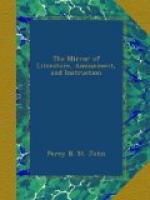“What dost thou see,” said the Demon, “that makes thee look so eagerly? Can he who has refused silver, and gold, and diamonds, be moved by a paltry bunch of rusty iron?”
“They are mine own, my lord,” said the Rabbi, “them will I take, if they be offered me.”
“Take them, then,” said the Demon, putting them into his hand;—“thou may’st depart. But, Rabbi, open not thy house only, when thou returnest to Cairo, but thy heart also. That thou didst not open it before, was that which gave me power over thee. It was well that thou didst one act of charity in coming with me without reward, for it has been thy salvation. Be no more Rabbi Jochonan the miser.”
The Rabbi bowed to the ground, and blessed the Lord for his escape. “But how,” said he, “am I to return, for I know not the way?”
“Close thine eyes,” said the Demon. He did so, and in the space of a moment, heard the voice of the Prince of Mazikin ordering him to open them again. And, behold, when he opened them, he stood in the centre of his own chamber, in his house at Cairo, with the keys in his hand.
When he recovered from his surprise, and had offered thanksgivings to God, he opened his house, and his heart also. He gave alms to the poor, he cheered the heart of the widow, and lightened the destitution of the orphan. His hospitable board was open to the stranger, and his purse was at the service of all who needed to share it. His life was a perpetual act of benevolence; and the blessings showered upon him by all, were returned bountifully upon him by the hand of God.
But people wondered, and said, “Is not this the man who was called Rabbi Jochonan the miser? What hath made the change?” And it became a saying in Cairo. When it came to the ears of the Rabbi, he called his friends together, and he avowed his former love of gold, and the danger to which it had exposed him; relating all which has been above told, in the hall of the new palace that he built by the side of the river, on the left hand, as thou goest down by the course of the great stream. And wise men, who were scribes, wrote it down from his mouth, for the memory of mankind, that they might profit thereby. And a venerable man, with a beard of snow, who had read it in these books, and at whose feet I sat, that I might learn the wisdom of the old time, told it to me. And I write it in the tongue of England, the merry and the free, on the tenth day of the month Nisan, in the year, according to the lesser computation, five hundred ninety and seven, that thou may’st learn good thereof. If not, the fault be upon thee.
* * * * *
STANZAS
Written on seeing Flags and other Ensigns of War, hanging in a Country Church.
BY ALARIC A. WATTS.




